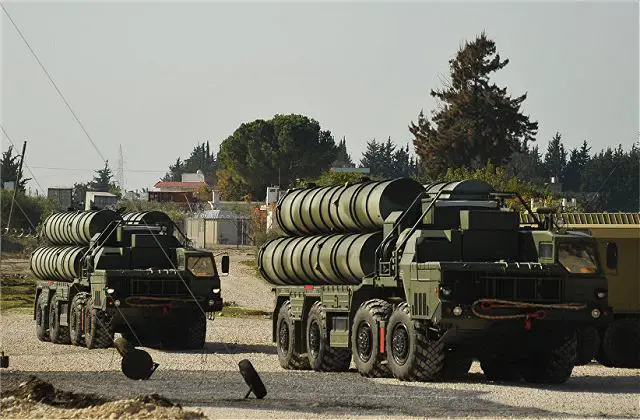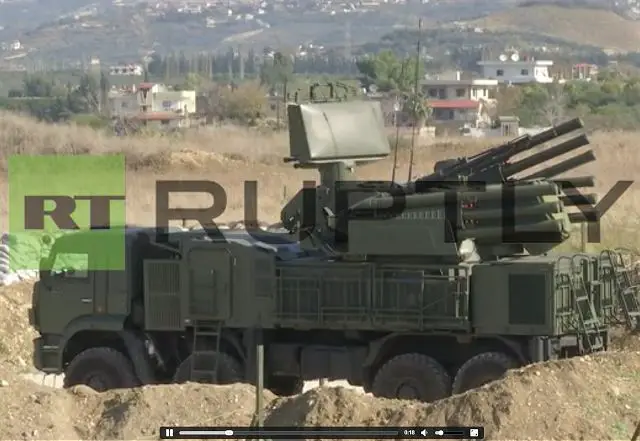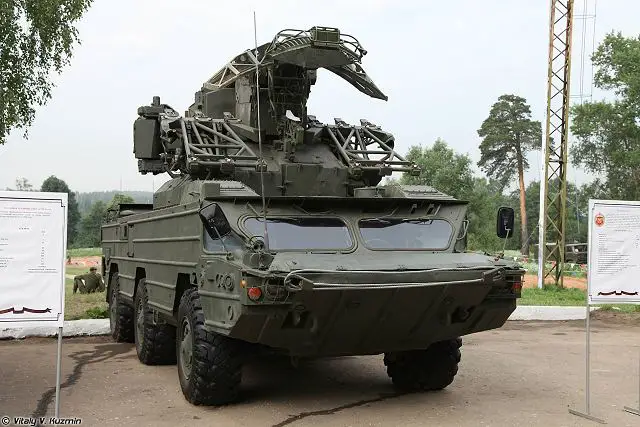Russia to boost the security on Syrian airspace with three layers of air defense missile systems 5040216
|
|
|||
|
The conflict in Syria
|
|||
|
|
|||
| Russia to boost the security on Syrian airspace with three layers of air defense missile systems. | |||
|
A Russian Sukhoi Su-24M (NATO reporting name: Fencer) was shot down by a Turkish F-16 fighter in Syrian airspace near the Turkish border on November 24, 2015. In response, the Russian leadership decided to boost the security of the air task force’s planes on mission in Syrian airspace and to step up the air defense of Khmeimim air base.
|
|||
|
|
|||
 Russian S-400 Missile Defense System Deployed in Syria Russian S-400 Missile Defense System Deployed in Syria |
|||
|
|
|||
|
As far as the surface-to-air missile (SAM)-based defense theory is concerned, it is enough to provide area defense for the key defense industry and military installations at the most probable avenues of approach in low-intensity conflicts , while large-scale military conflicts necessitate area and point defense.
As far as Khmeimim air base is concerned, it is provided with purely point defense. In addition, its SAM-based air defense resulted from pooling the efforts with the air defense elements of other armed services, particularly the Russian Navy, and the air defense elements of the Syrian Arab Republic. To a certain extent, there is the implementation of the territorial SAM-based air defense principle at Khmeimim AB. Beefing up the Russian SAM element in Syria with a cutting-edge S-400 Triumph (SA-21 Growler) long-range SAM system has considerably improved the AD coverage of the key facility, Khmeimim AB, and allowed reaching targets flying at higher altitudes and speeds. In addition, the AD element’s survivability and immunity has grown sharply in terms of possible fires- and electronic countermeasures-heavy environment. A combined Russian-Syrian AD force is believed to have been deployed in the war zone as far back as November 2015, comprising Pantsir-S1 (SS-22 Greyhound) close-in SAM/AA systems, Osa-AKM (SA-8 Gecko) and S-125 Pechora-2M (SA-3 Goa) short-range (SHORAD) SAM systems, Buk-M2E (SA-17 Grizzly) medium-range SAM systems and S-200VE Vega (SA-5 Gammon) and S-400 Triumph long-range SAM systems. Moreover, a decision was made to add the S-300FM Fort-M (SA-N-20) Naval SAM systems of the Moskva and Varyag (Slava-class) guided missile cruisers in Syria’s littorals in order to augment the air defenses in the wake of the Su-24M’s downing on November 24, 2015. To cap it all, Krasukha-4 electronic warfare (EW) systems were deployed in Khmeimim AB to protect it from hostile air and space reconnaissance assets. |
|||
|
|
|||
 Russian Pantsir-S1 (SS-22 Greyhound) at Khmeimim air base in Syria |
|||
|
|
|||
|
Thus, a task force capable of eliminating hostile warplanes, helicopters, cruise missiles and reconnaissance, EW and other aircraft was formed promptly.
Moreover, Khmeimim AB’s layered SAM-based air defense based on composite Air Defense Force, Army Air Defense and naval AD groupings was established and enabled to handle non-strategic missile defense missions. The latter capability is provided by the S-400 Triumph. At least three layers are apparent in the SAM-based air defenses of Khmeimim AB: - The first layer is provided by the S-400 and S-200VE long-range systems. - The second one is handled by the S-300FM Fort-M and Buk-M2E medium-range systems. - The third layer is furnished by the Osa-AKM and S-125 Pechora-2M SHORAD systems. Finally, the Pantsir-S1 close-in systems should be considered to be a means of covering the air base and S-400. |
|||
|
|
|||
 Pechora-2M surface-to-air defense missile system |
|||
|
|
|||
|
As far as the volume of fire and SAM-based air defense depth are concerned, we should prefer the latter, because it is the most objective parameter of SAM-based air defense. In this respect, the S-400’s 40N6E long-range missile capable of killing aircraft out to 400 km is of special interest. With SAMs like that, the S-400 can cover almost all of Syria and even part of adjacent regions.
Of particular interest to experts is the possible tactical employment of the S-400 SAM system system, if the right conditions are right for that. Compared with the S-300 (SA-10 Grumble), the Triumph can destroy a much wider range of threats travelling at a speed of 4,800 m/s, e.g. intermediate-range ballistic missiles with a range of 3,000-3,500 km. It also can handle pinpoint targets and stealthy threats at a range extended by 50% owing to an increase in the power generation capabilities of the 91N6E radar system and 92N6E multirole radar. The introduction of advanced electronic countermeasures (ECM) resistance solutions has boosted the system’s ECM immunity by several times. Finally, its reliability has grown and its size and power consumption have dropped owing to its cutting-edge electronics, sophisticated self-contained power supply and advanced vehicles. Military experts believe the Russian AD task force in Syria will both prevent new attacks on Russian warplanes and disrupt air strikes by third parties against targets in Syria. |
|||
|
|
|||





























